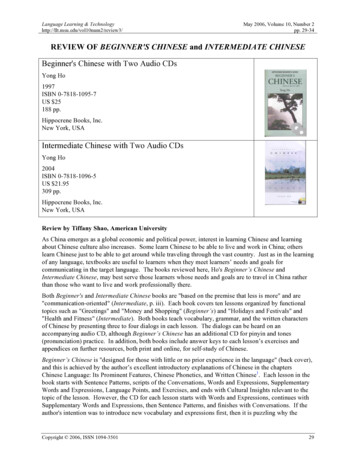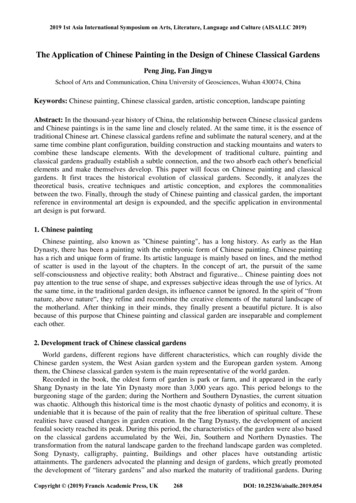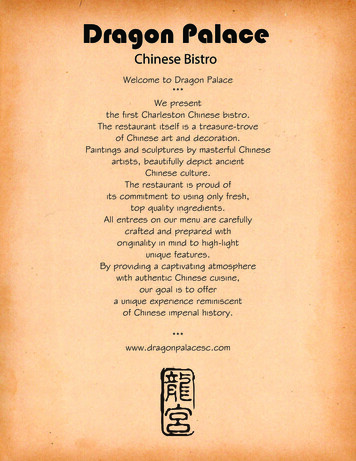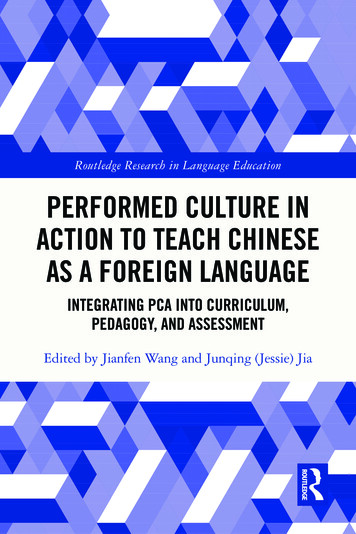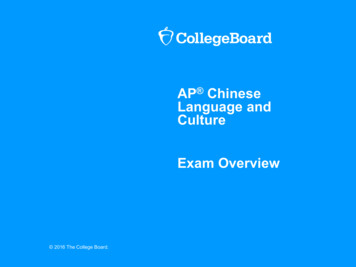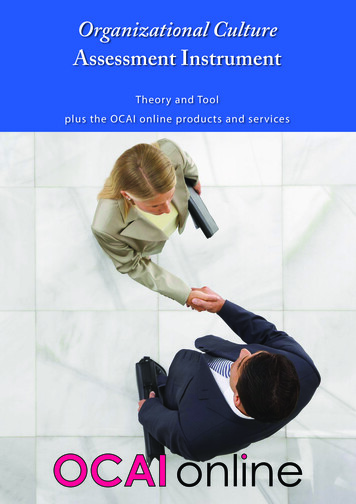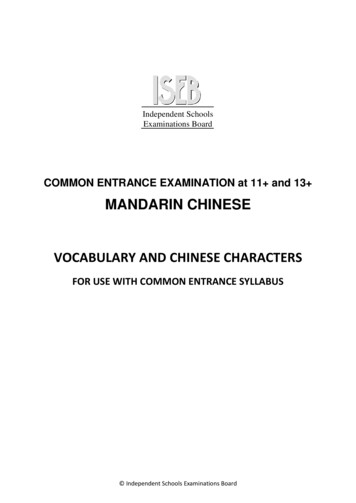
Transcription
ChineseCULTURE PROFILE
Published 2006 by:DiversicarePO Box 5199West End, Queensland, 4101Phone: (07) 3846 1099Chinese Culture ProfileThanks is given to the following people:Margaret Hess, Director, DiversicareElizabeth Zajac, Project Officer, PICACStephanie Lee, Program Manager, CathayCommunity Association and to all those persons who have providedcomment about this directory.Editor: Jennifer Leigh (J Leigh & Associates)DisclaimersThis directory is a synthesis of information from arange of sources believed to be reliable. Diversicaregives no warranty that the said base sources arecorrect, and accepts no responsibility for anyresultant errors contained herein or for decisionand actions taken as a result and any damage.Please note there may be costs associated withsome of the resources and services listed in thisprofile.
INTRODUCTION4BACKGROUNDMigration experienceAustralian statisticsCustoms in everyday lifeCultural stereotypes55668FAMILYFamily structureAttitudes to residential care9910PERSONAL RE AND RECREATIONDaily RoutineSocial 212131313141515RELIGIONProfileImportant days141415FOOD AND DIETMealsFood sources181820HEALTHTrauma situationsAttitudes to illness and painPerception of health professionals21212121DEATH AND DYINGPalliative careDeath & dying222222LANGUAGE23PHRASE CARDS24ADDITIONAL RESOURCES39CORRECTION / ADDITION FORM41
INTRODUCTIONThis profile of the China culturalcommunity is one of the many projectsundertaken by the Queensland Partners inCulturally Appropriate Care (PICAC). The organisation’s compliance with theThe Queensland PICAC Project aims tofacilitate the development of partnershipsbetween ethnic community groups andresidential aged care service providers toimplement “best practice” strategies ofcare for older people from diversebackgrounds. The project is about ensuringthe needs of older people from a Chinesecultural background are met.The profile provides useful informationabout a range of topics, resourcesincluding books, articles, audio-video aids,services, and so on.Funded by Commonwealth Department ofHealth & Ageing, the project in Queenslandis managed by Diversicare under theauspice of the Ethnic Communities Councilof Qld.Population trends within Australia areincreasingly characterised by a diversity ofpeople, languages and culture. Coupledwith this trend is an ageing population,also with a rich diversity of languages andcultures.It’s not surprising then, that residentialaged care service providers are faced withincreasing demands for culturallyresponsive facilities and care.This profile aims to assist by enhancing: Staff knowledge of the cultural andlinguistically diverse needs of personsfrom a Chinese background. It also seeksto facilitate the professional competenceand development of staff in theprovision of culturally inclusive care; and4Residential Care Standards and NationalAged Care Standards as they pertain tothe issue of cultural and linguistic needs.This symbol is used to indicate a “tip”,which YOU, as the caregiver of aperson who was born in China, mayfind useful in your day-to-day supportof that person.This guide is not intended to replace onestereotype of this culture with another;instead it is intended to provide someinsights into the culture. Nor does itdiminish the importance of youestablishing the individual cultural needsof each person as part of the careplanning process.In an effort to maintain the accuracy ofthis profile and improve its contents, forall stakeholders, we encourage readers tocomplete the feedback form on the lastpage to inform us of any inaccuracies orother resources available. It is consideredthat this feedback will assist us maintain auser relevant and quality resource.Yours SincerelyMargaret HessDirectorElizabeth ZajacPICAC Project Officer
BACKGROUNDChina (official name – People’s Republic ofChina) covers one-fifteenth of the world’sland mass and is the third largest countryin the world. Its border stretches over22 000 kilometres on land and thecoastline extends well over 18 000kilometres, washed by the waters of theBohai, the Huanghai, the East China andthe South China seas. The Bohai Sea is theinland sea of China.Migration experienceThe first Chinese migration wave can betraced to 1827, when large numbers ofChinese labourers were recruited to workin the pastoral industry. Many others whoarrived in the 1870s to join the gold rushfollowed these first migrants.The 1861 Colonial Census, the China-borncomprised 3.4 percent of Australia’s5
population, and was the second largestimmigrant group after those from theBritish Isles. Following changes toAustralian government policies theimmigration of Asians declined in 1947.In 1976, the ‘Australian-Chinese FamilyReunion Agreement’s’ legislation had adirect effect on the increased numbers ofolder migrants who arrived to join theirchildren in Australia. Most of the Chinesespeaking immigrants, however, cameprimarily from other countries such asCambodia, Malaysia, Singapore and Vietnam.The above data means the person youare caring for is most likely to havebeen educated, have worked in askilled job outside the home and beenpart of established social andrecreational links to other Chinesepersons.Cantonese and Mandarin speaking peoplecan be born in different countries: Cambodia-born940 people41% Hong Kong born6710 people10%7980 people10.1% Malaysia born Taiwan born8440 people37.6% Vietnam born11570 people 7.5%Australian statisticsThe China-born population is one of themajor communities in Australia and itspopulation is concentrated in large cities,such as Sydney, Melbourne and Brisbane.The 2001 Census recorded 142,720 Chinaborn persons settled in all AustralianStates, with Queensland being the thirdlargest State behind NSW and Victoria. Ofthe total Chinese speaking population inAustralia (2001 Census): 14.9% were 65 and over 33.7% had higher qualification (comparedwith 46.2% for all Australian) 55.2% were employed in a skilledoccupation, 24.6% in semi-skilled and20.3% in unskilled jobs; and male comprised 46.6% and females 53.4%;and their ancestry includes Chinese 92.5%,Russian 2.9%, English 0.4% and other4.2%(source: Chinese Community InformationSummary, DIMIA 2003)Queensland has 6.2% or (8860 persons) ofthis total population and they have settledacross Queensland.6Country of origin may influence socioeconomic status, knowledge of English andexposure to Western cultures.In this publication the term: “Chinesepeople” is used. Be aware that thisterm is problematic because itrepresents a heterogenous group ofpeople who can have widely differentlife experiences, cultural tradition,dialects, educational opportunities,and economic position. As mentionedpreviously they have experienceddifferent patterns of migration: somehave settled in Western countries viaother countries such as Singapore orHong Kong, and some have moveddirectly from mainland China.Customs in everyday lifeFormal manners are important.Greetings. The correct way of greeting aperson is very important in Chineseculture: an inappropriate greeting isconsidered undesirable. Handshaking is the
accepted greeting. A handshake not onlyexpresses a sign of welcome, but gratitude,congratulation and encouragement as well.In China, the most useful form of greetingis a nod or slight bow. Upon meetingsomeone, the Chinese lower their eyesslightly as a sign of respect. Staring intothe eyes of a Chinese person might makethem uncomfortable. The phrase ‘Have youeaten?’ is used as a more familiar greetingand testifies to the centrality of food inChinese culture.Referring to others. When addressing anelder or person with high status it isconsidered highly inappropriate and rudeto address the person by their given name.They should be addressed according totheir designation, for example: Mr Tang,Doctor Liu, and Chairman Lee etc. Eachperson has a family or generational nameand a first name (example of reading thenames: Zhang Tai Man – Family Name Zhang; Generation Name - Tai; Given Name- Man). Avoid using someone’s given nameunless you have known the person for along period of time.A married Chinese woman usually retainsher maiden name, she will use herhusband’s last name on occasions forformal addressing only. It is common socialpractice to introduce the junior to thesenior, or the familiar to the unfamiliar.When you start a talk with a stranger, thetopics such as weather, food or hobbiesmay be good choices to break the ice. Giftgiving is unsuitable in public except forsome souvenirsGestures. Chinese used to cup one handin the other before the chest as a salute(this tradition has a history of more than2000 years).Avoid making exaggerated gestures orusing dramatic facial expressions. Usinggestures while speaking to more reservedcultural groups can make communicationmore difficult. Avoid touching until arelationship is established. Avoid touchingthe child’s head since ‘careless touching’ –it is believed to reduce the child’sdevelopment.Use an open hand rather than one fingerto point. To beckon or call someone towardyou, turn palm down and wave fingerstowards your body. Pointing to one’s noseis the indication for ‘I’ or ‘me’ similar to theAustralian gesture of pointing to one’schest to indicate self.Hands have a lot to do with face. Bothhands should take objects that are offeredto you as a sign of respect. Furthermore, itis recommended to hand any object ofimportance e.g. forms or brochures, byboth hands directly to the person and notjust putting it down on the table.Entering the room. A Chinese host, inapproaching the door with a guest, wouldusually gesture for the guest to proceedfirst. “When your guest departs, youshould see them to the front door of thebuilding, or to the elevator at the veryleast” – certainly this is true for formalvisits, or the first time somebody visits athome. The further one sees somebody off,7
the more respectful it is. The guest, inturn, should try to decline the courtesy bysaying – “No need to see me off”.Common farewells to a guest are“Goodbye”, “Go carefully” or “Come again”.Attire. There are no specific rules inChinese custom governing dress. Someconventions are considered with regards toage: the elderly are not encouraged to‘dress young’, for example t-shirts andjeans.Taboos. Similar to Western customs, youshould be cautious to ask women privatequestions.Odd numbers are thought to beunfortunate – so wedding and birthdaygifts for the aged are always sent in pairs.Though ‘four’ is an even number, it readslike death in Chinese thus is avoided (fouris pronounced similar as death). Instead ofsaying ‘4’, you can say ‘2 more than 2’.During the 10 days of the Chinese NewYears celebration you should not usenegative words and phrases – this is timeof happiness and looking forward toprosperity. Also during this time of year donot throw anything away – throwing awaythings away during this time is akin tothrowing away the good luck.Try to avoid White and black colours, bothof them symbolise death in Chinese culture.The colours red and gold are lucky.8Do not give taboo gifts, which includeclocks (escorting someone to the grave),green hats (means infidelity), pears(sounds like separation) or handkerchiefs(used in funerals).It is not appropriate to ask the personabout his/her financial matters (forexample asking: “how much do you earn”).The Chinese, who left their country oforigin and settled in other lands, haveheld strongly on to their traditionsfor fear of losing their identity. As aresult, they continue to practice orobserve traditions that have beenlong discarded in their motherland.The above customs may not beevident in the younger generations. Itis important YOU check on whetheradherence to these, or other customsunique to their region of origin.Cultural stereotypesThe Chinese tend not to greet those closeto them with greetings that may bear anegative slant such as ‘you’re looking sad’or ‘you are looking tired’ – this is deemedimproper. The concept of ‘face’, whichinvolves avoiding making someoneembarrassed, is very common among theChinese in considering their choice ofaction.Punctuality issues – lateness or cancellation can be a serious affront. Thispertains to business and social occasions.
The older generation expect that theyounger generation will be polite, caringand paying respect to older people. Do notjoke with older people – they can feeloffended.It should be remembered this is justone view and does not apply to everyChinese person. This reality meansYOU should establish each person’spreferences.Having established this person’s preferences be careful not to replace one culturalstereotype with another related to whatshould be considered stereo-typically‘Chinese’.For more information“The Chinese community”, CommunityInformation Summary, Department ofImmigration and Multicultural andIndigenous Affairs (DIMIA), 2003. Availableas a PDF document from the following webaddress:http://www.immi.gov.au/statistics/stat info/comm summ/summary.htmFAMILYFamily structureChina largely operated as a male-centredsociety, in which the family name is passeddown through the male line. Family plays afundamental role within Chinese cultureand there are strong conceptions of whatmarriage and family should be.The Chinese man continues to occupy adominant position in the family in terms ofdecision-making. Chinese women areacquiring greater equity with men as theycontribute their income or labour often ina family business.The stereotyped view of the Chinese familyis that of a large extended family, withseveral generations and immediate familiesall living under one roof, being a selfsufficient and self-help institution for itsmembers, providing child care and the carefor of the elderly.This is no longer true for the modernChinese family. The family structure ismainly a nuclear one with husband andwife living with their children andsometimes their parents. Therefore, theChinese family no longer performs thefunction of providing mutual help withchild care and care for elderly outside theirimmediate relations.However, the Chinese continue toemphasise the values of family and tomaintain close family links. There is astrong bond between parents, children andother family members. It is still customarythat Chinese parents expect all theirchildren to return home for the Chinese9
New Year Eve’s dinner and other festivalcelebrations.Whilst egalitarian roles are more widelyaccepted in families of Chinese professionals, many Chinese families still feel thatwomen’s roles are primarily the raising ofchildren and running the home.Most Chinese elderly prefer to stay withtheir families, so separation should be thelast resort, which is usually achievable,provided the older person accepts outsidehelp and support.Attitudes to residential careSome Chinese people may feel they have‘lost face’ in their community if they acceptoutside help with caring for their ageingparents, or permit their parents to move toan alternative accommodation. They can beregarded as lacking filial respect, as beingself-centred and cold-hearted.Older people who move away from livingwith their families might feel shame for‘being abandoned’ by their children, orguilt for being considered as ‘bad parents’and deserving this treatment. As the resultof changing circumstances of Australianfamilies and financial issues – many olderChinese people are moving to residentialfacilities.If you need help to provide culturallyappropriate care, the assistance of thePICAC Project Officer is available freeof charge to your agency or theresident. This service is restricted tothe greater metropolitan Brisbane andTownsville. For more information onPICAC contact Diversicare on(07) 3846 1099.10PERSONAL HYGIENEThe routines and preferences surroundingthe following personal hygiene activitiesgreatly impact on the person’s sense ofself, pride, dignity and confidence.BathingThe older Chinese person for the morningwash will prefer to use a basin with a bathat night being their preference. Sometimes,when feeling not well Chinese people maylike to add some herbs to the bath water. Itis important that female residents supportwith bathing be provided by a woman.DressThere are no specific rules in Chinesecustom governing dress. Traditionalcostumes are rarely worn and clothing isusually chosen for comfort or according tothe fashion of the day.Bright colours are preferred for clothing inChinese culture. Some convention applieswith regard to age: the elderly areencouraged to wear dresses with highneck, collar closed, and with short, mediumor full length – depending on season andtaste.GroomingWomen will prefer to comb or groom theirhair; no hair should be on their faces.Women do not wear makeup, nail polish orperfume; they wear only ear rings(connected with the family or marriageceremonies). Men do not usecologne/aftershave, but they will trim theirnails.
It is important each person’s preferences in their dress, bathing,grooming etc are established as partof their care plan.PENSIONSPeople who lived in China and worked forgovernment organisations/institutions areoften eligible for a partial pension paymentfrom their country. Australia doesn’t havereciprocal arrangements in place(regarding the payment of pensions) withmany of the countries of origin from whichChinese people may emigrated.Problems with Centrelink can arise for theperson if he/she fails to notify Centrelinkof any increase in the foreign pensionamount. In this situation the Australiansupplement is reduced according to theincreased amount. Failure to notifyCentrelink can result in a debt and finebeing imposed by Centrelink.To check if eligible for any paymentcontact the Chinese Consulate:Level 9, 79 Adelaide StreetBrisbane Qld 4000PO Box 12126, George StreetBrisbane Qld 4003Ph (07) 3210 6509Fax (07) 3012 r more informationCheck your local telephone directory foryour local Centrelink office.11
LEISURE AND RECREATIONFamily plays an important role in leisurewith no definite preferences from indooror outdoor activities. Outdoor activitieswould include walking, doing easyexercises, Tai-Chi, gardening (vegies,flowers or herbs). Indoor activities couldinclude listening to Cantonese Operamusic, or pop music (usually from 40’s &50’s), watching movies, playing chess orMahjong (which is a game involving 4people) - download how to play instructions fromhttp://en.wikipedia.org/wiki/MahjongSome older Chinese women may beinterested in painting or crafts.The Chinese enjoy eating and celebratingfor any occasion and it is usually time forfamily coming together.The above information can assist indeveloping diversional therapyactivities eg tending potted flowersthat are kept in the person’s roomand/or a small box of vegetables keptin a communal area and/or cookingcakes or pastries, craft work and/orcard, chess or board games. However,YOU need to check with eachindividual his or her preferences inregard to the above.Daily RoutineChinese people like a routine (eg time formeals, bath and activities) and generallyhave a structured pattern to the day andlike sticking to these times.12You need to establish with eachindividual his/her preferences relatedto his/her daily routine and timings.Social groupsA diverse range of Chinese social groupsmeet in various parts of Queensland andprovide community functions, arts, music,information and education.Contact details are:Cathay Community Association161 Wickham St, Fortitude Valley QPh (07) 3252 9066Mainland Chinese Society Qld Inc7 Kentucky St, Sunnybank Hills QPh (07) 3344 6868Gold Coast Chinese ClubPO Box 218 Surfers Paradise Q 4217Ph (07) 5572 0525Townsville Chinese Club66 Boundary St, South Townsville QPh (07) 4723 5155Rockhampton Chinese AssociationPO Box 6485 Central Qld MC 4702Ph (07) 4928 5468Happy Senior Club of BrisbanePO Box 886 Sunnybank Q 4109Ph (07) 3279 2662(meets every Saturday at McGregorState School)
TelevisionThe SBS television network is available inmajor cities in Queensland. SBS providesCantonese and Mandarin-speaking movies,serials and news. 119 Glenora, Wynnum, Ph 3396 2660 In greater metropolitan Brisbane, Briz31also have programs about China. Briz31programming can be downloaded fromtheir website by going to the followingaddress: http://briz31.tv/news.aspCheck your TV program guide or thewebsite for local viewing time as theymay change in rural areas or acrosstime zones.MoviesChinese (Mandarin and Cantoneselanguage) DVDs are available for purchaseat larger Department stores (eg. Big W). Itis important you check on the back of theDVD for the list of languages in which it isavailable.In most Video libraries you can find moviesin Mandarin or Cantonese. Video MovieHire & Sales: Academy Movie Library247 Sandgate Road, Albion, Ph 3262 7322 Auchenflower Video409 Milton Rd, AuchenflowerPh 3870 1955Brisbane CamHireBelmont, Ph 3348 9880 SBS television programming can bedownloaded from their website by going tothe following address:www.sbs.com.au/whatson/index.then choose what you are interested infrom the listed menu.Bayside VideosBirkdale Video120 Birkdale Rd, Birkdale, Ph 3822 2433 Civic Video Pty Ltd196B Sandgate Rd, BoondallPh 3865 3667It is also possible to purchaseMandarin/Cantonese-language movies viathe internet by doing a search, en go to show Google cache than go toQuick Link and press Cantonese orMandarin.You can also search the Brisbane CityCouncil library catalogue via its languagecollection by going to the followingwebsite and choosing the preferredlanguage which will then take you to ascreen where you choose your category ofinterest (eg movies, books, music, Broadcasting in Mandarin and Cantoneselanguages occurs on SBS – radio 1107AMfrom m10.00am08.00am–––––––12.00 Monday11.00 Tuesday9.00 Wednesday9.00 Thursday11.00 Friday11.00 Saturday9.00 Sunday13
Cantonese:Newspapers11.00am – 12.00 Monday8.00pm – 9.00pm Tuesday10.00am - 11.00am Wednesday10.00am – 11.00am Thursday2.00pm – 3.00pm &8.00pm – 9.00pm Friday8.00pm – 9.00pm Saturday10.00am – 11.00am SundayThere are number of ways to access someCantonese and Mandarin languagenewspapers:In greater metropolitan Brisbane, it is alsopossible to tune into 4EB (FM98.1) andtheir program guide can be downloadedfrom their website at the tmBroadcasting in Mandarin and Cantoneselanguage occurs on 4EB FM98.1:Mandarin:11.00pm Monday11.00pm Thursday10.45pm Friday8.00pm Saturday3.15pm Sunday &10.00pm Sunday Cantonese/MandarinCantonese:9.15pm – 9.45pm Monday10.30pm Saturday10.15am Sunday &10.00pm Sunday Cantonese/MandarinFor more specific information you cancontact Radio 4EBFM – Cantonese andMandarin sections: Ph (07) 3240 8600Fax (07) 3240 86331) Every Friday, you can pick up free localChinese Newspapers outside restaurantsand grocery stores in Fortitude Valley andSunnybank. Examples of these localnewspapers are Qld Asian Business Weekly,World News Weekly, Queensland ChineseNews, Bridge Magazine etc.Sing Tao Daily is a daily Chinesenewspaper published in Sydney, can bepurchased from newsagency and Chinesegrocery stores in Fortitude Valley andSunnybank.2) Go to the following web ewerand access a copy of the followingnewspapers: China Daily Shanghai Daily3) You also can search on the web usingthe name of the publication4) For more information contact belowmentioned Newspapers & Publication: Asian Community NewsPh 3324 1609, news@acnews.com.au Bridge MagazinePh 3257 1500, www.ebridge.com.au Queensland Chinese NewsCheck your radio program guide orthe website for local listening timesas they may change in rural areas oracross time zones.14Ph 3252 8183, Email: sales@qcn.net.au World NewsPh 3841 5688, www.world-news.com.au
If the person can’t use a computer,don’t forget you can access theinternet and load these newspapersand print all or some pages whichcan then be given to the person toread at their leisure.BooksBrisbane City Council libraries have avariety of books in Simplified Chinese andTraditional Chinese. Regardless of yourlocation in Queensland it is possible toarrange to have these books sent to yourlocal library for a small fee.You can search the Brisbane City Councillibrary catalogue via its language collectionby going to the following website andchoosing the preferred language which willthen take you to a screen where youchoose category of interest (eg movies,books, music, DVDs):http://elibcat.library.brisbane.qld.gov.auTo buy Chinese books contact:Shop 1, 31 Duncan StreetFortitude Valley Q 4006Ph 3252 5557Email: egb168@yahoo.com.auShop 10, Market Square341 Mains Road,Sunnybank Q 4109Ph 3345 5111Every council library in Queenslandborrows from the Qld State Library.The State Library itself has Chineseresources (books, videos, CDs etc),which your local library can arrangeto borrow for a small fee.You can do a search of the State Libraryresources (which will list the resource,type of resource and call number) by goingto the following web address:http://www.slq.qld.gov.au/find/catOnly for those persons who are visuallyimpaired and a member of the Qld BlindFoundation, it is possible to borrow fromits talking book library, which has someMandarin and Cantonese language tapedbooks. You will need to complete anapplication form, and if approved,borrowing rights then apply. ContactTelephone: 1300 654 656 to obtain areferral form.MusicMusic is very important for Chinesepersons regardless of gender. It is strongcultural expression of who that person isand the religion he/she lived in. Olderpeople with Chinese background would liketo listen Cantonese Opera music or popmusic from 40s and 50s.You can contact Cathay CommunityAssociation to get information on how toborrow music tapes or DVDs from them.You can search the Brisbane City Councillibrary catalogue via its languagecollection by going to the followingwebsite and choosing the preferredlanguage which will then take you to ascreen where you choose your category ofinterest (eg movies, books, music, A3lL2U/44230061/1/1246/XPlease note, a fee may apply for organisinginter-library loans.15
Again establish each individual’spreferences and check whether familymembers can assist in findingCantonese or Mandarin languagebooks, videos, DVD, music etc.For more informationRefer to Diversicare’s MulticulturalResource Directory (2004) for more detailedinformation about sources and otheroptions.Cathay Community AssociationPh (07) 3252 9066Chinese Business Directory (available fromChinese Consulate) or Chinese .auRELIGIONProfileWhile China is officially an atheist state,religion still plays a significant role formany Chinese. Confucianism is the basisaround which the cultural aspects ofChinese life is organised. Confucianism ispracticed more as a philosophy, than areligion.Although Chinese people might not all bereligious, going to the temple or churchcan have spiritual value and can providethem with social interaction. The 2001Census shows the major religions amongstChina-born persons were Buddhism andWestern Catholicism.The 2001 Census related to the religionbeliefs for other countries withMandarin/Cantonese speaking peopleshows that Buddhists, Taoism, Muslim andChristians are the religions of theseregions.The religion observed by each Chineseperson impacts on everyday observances,e.g. Muslims do not eat pork, someBuddhists are vegetarian etc.Remember there can be a differencebetween nominating a particular religionto practicing that religion in ones’everyday life (or whether all or only somerituals/practices within that religion areobserved).16
YOU need to establish each person’sreligious preferences and link him/herinto a local minister of that religion.Important daysThere are a variety of special events withmany of them varying from year to yearbecause the Chinese use the Chinese LunarCalendar.FestivityMonth / DateCustomary practicesNew Year’ Day1 January to15 January ChineseLunar CalendarParties everywhere: in parks, dancing halls anduniversities.Qing MingRefer to ChineseLunar CalendarOriginally it was a celebration of spring. People usedto customarily go out on an excursion to “treadgrass”. Later it became day dedicated to the deardeparted. Tidying up ancestors’ tombs is the majorbig event.Buddha’sBirthday7 MayWill be celebrated by Buddhists only.Dragon BoatFestival5 May Chinese LunarCalendarEating of bamboo-leafs and rice dumplings.Chung YeungFestival orChongyangFestival9 SeptemberChinese LunarCalendarThis day is celebrated as a Double Yang Festival. Itis marked by a family outing, particularly going upto the top of a hill. Viewing and admiring juhua(chrysanthemum flowers), decorating houses withzhuyu (cornus official plants), eating double-yangcakes, and drinking chrysanthemum wine are partof the festival. In 1989, the Chinese governmentmade the festival the Elders’ Day to encourage youngpeople to respect their parents.Mid-AutumnFestival15 August ChineseLunar CalendarThe moon on this day is the fullest and largest tothe eye. Viewing it with the whole family whilefeasting on good wine, fruits and moon-cakes occurs.Family DayComing ofWinter DayAlways around Xmas3 – 4 days beforeChristmasFamilies celebrate the end of the work in the farmor field. Good food preparation, dancing, singingand consuming wine.17
Mother’s DayThis day promotes filial respect for parentswith a carnation often given as thepresent.ChristmasThe Chinese, particularly the younggeneration, embrace Christmas withoutpaying attention to its religiousbackground. They decorate their homeswith Christmas trees and lights, givingtheir children gi
Published 2006 by: Diversicare PO Box 5199 West End, Queensland, 4101 Phone: (07) 3846 1099 Chinese Culture Profile Thanks is given to the following people:

